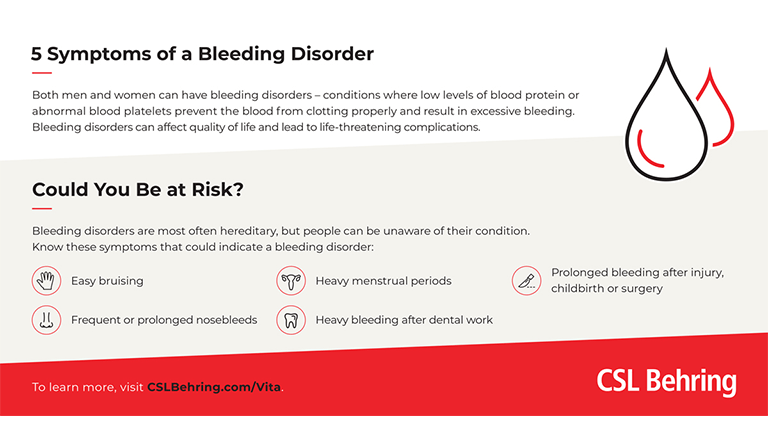Many women don’t know they have von Willebrand Disease (VWD) because they – and their doctors – overlook a common symptom: heavy menstrual bleeding.
Dr. Andra James, recently interviewed on CSL Behring’s World of Promise podcast, said she first became aware of this issue about 20 years ago while attending a gathering of the American Society of Hematology. She now recommends that every woman who experiences this symptom get tested for an underlying bleeding disorder.
“I understood that women with bleeding disorders had heavy menstrual bleeding, but until I attended that meeting I, like my colleagues, did not appreciate that women with heavy menstrual bleeding are more likely to have an undiagnosed bleeding disorder,” said James, a maternal-fetal medicine specialist, and a professor in the Department of Obstetrics & Gynecology at Duke University.
Know the Symptoms
Other symptoms of bleeding disorders include:
- Easy bruising
- Prolonged bleeding after injury, surgery or childbirth
- Frequent or prolonged nose bleeds
- Heavy bleeding after dental work
James says that one of the biggest hurdles is that many OB/GYN doctors view heavy menstrual bleeding as “a strictly gynecologic problem to be treated with hormones and possibly surgery.” One of James’s goals is to educate more of her colleagues about the need to test for von Willebrand Disease and other bleeding disorders. Doctors can order blood tests to diagnose these problems.
So what should women do if they have symptoms of a bleeding disorder? “First and foremost, get tested,” James says.
According to the National Hemophilia Foundation, about 1 percent of the U.S. population has von Willebrand Disease. Both men and women are equally affected. If someone learns they have a bleeding disorder, they can move on to the next steps of getting more information from the doctor and starting treatment. Patients should find out exactly which type of bleeding disorder they have, because there are several, James said.
“I usually encourage patients to try and find out if there's a hemophilia treatment center (HTC) in their area. Sometimes private hematologists don't necessarily have a connection with support groups,” she said, adding that there are many resources available online, including connections to support group meetings.
Do Other Loved Ones Have Symptoms?
“Also I encourage them to talk to other family members because if there's other family members experiencing this, they may also have von Willebrand Disease, so it's important for everyone to be tested.”
Hear more from James on this topic by listening to the full episode of “World of Promise.”




